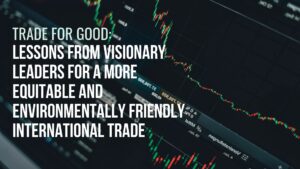In an interconnected world where international trade drives economies and shapes societies, it is crucial to examine the practices and lessons from successful individuals who have paved the way for a more equitable and environmentally friendly approach to global commerce. As we strive for a brighter future, it is essential to consider the social and environmental impacts of international trade.

In this article, we will delve into the valuable insights offered by visionary leaders who have championed best practices for a sustainable and fair global trading system.
1. Jane Adams’ Ethical Entrepreneurship: Putting People at the Core of Trade
Jane Adams, a prominent entrepreneur with a passion for ethical trade, highlights the significance of putting people at the forefront of international trade. By championing fair trade principles, Jane has transformed her business practices to ensure that workers receive fair wages and operate in safe conditions.
She actively collaborates with marginalized communities, providing them with opportunities for economic empowerment. Jane’s commitment to prioritizing human rights and dignity sets a powerful example for others to follow, fostering a more equitable global trading landscape.
2. David Thompson’s Sustainable Sourcing: Respecting the Planet and Profits
David Thompson, a successful business leader, demonstrates the importance of sustainable sourcing in international trade. He recognizes that responsible environmental practices are not only ethical but also make good business sense. David actively seeks out suppliers who adhere to sustainable practices, such as reducing carbon emissions, minimizing waste, and protecting natural resources.
By integrating sustainability into his supply chain, David not only safeguards the environment but also creates a competitive advantage in the marketplace. His success highlights that profitability and planet protection can go hand in hand.
3. Maria Hernandez’s Collaborative Connections: Strengthening Partnerships for Impact
Maria Hernandez, a visionary leader in international trade, emphasizes the power of collaboration and partnerships. She understands that addressing complex global challenges requires collective action. Maria actively builds strong alliances with like-minded organizations to drive meaningful change. By pooling resources, knowledge, and expertise, she amplifies the impact of her initiatives.

Through collaborative efforts, Maria fosters innovation, advances sustainable practices, and creates a ripple effect that extends far beyond her own business. Her approach underscores the importance of collaboration as a catalyst for positive change in international trade.
4. John Davis’ Advocacy and Education: Spreading Awareness for Responsible Trade
John Davis, an influential advocate for responsible trade, recognizes the vital role of education and awareness in transforming international trade practices. He actively engages in raising awareness about the social and environmental impacts of global commerce. Through workshops, seminars, and advocacy campaigns, John empowers consumers and businesses to make informed choices that prioritize sustainability and equity.
His dedication to education and awareness drives a broader understanding of the power of responsible trade. John encourages individuals and businesses to be active participants in shaping a more sustainable and equitable global trading landscape.
5. Lisa Thompson’s Policy Reform: Driving Change at the Systemic Level
Lisa Thompson, a passionate advocate for policy reform in international trade, believes that sustainable and equitable practices require systemic change. She works tirelessly to influence policymakers, urging them to implement regulations that promote fair trade, protect workers’ rights, and mitigate environmental harm.
Lisa’s dedication to policy advocacy highlights the importance of engaging with governments and institutions to create a regulatory framework that supports a more sustainable and equitable international trade system. Her work serves as a catalyst for meaningful change at the systemic level.
Conclusion
In a rapidly changing global landscape, it is imperative to learn from the experiences and insights of successful individuals who are driving positive change in international trade. By prioritizing ethics, sustainability, collaboration, education, and policy reform, these visionary leaders offer invaluable lessons for a more equitable and environmentally friendly global trading system.
As we move forward, it is essential for businesses, policymakers, and consumers to embrace these best practices and collectively shape the future of international trade. By integrating social and environmental considerations into our trade practices, we can build a more sustainable, fair, and prosperous world for generations to come.
Let us draw inspiration from these remarkable individuals and work together to create a future where international trade benefits both people and the planet.
